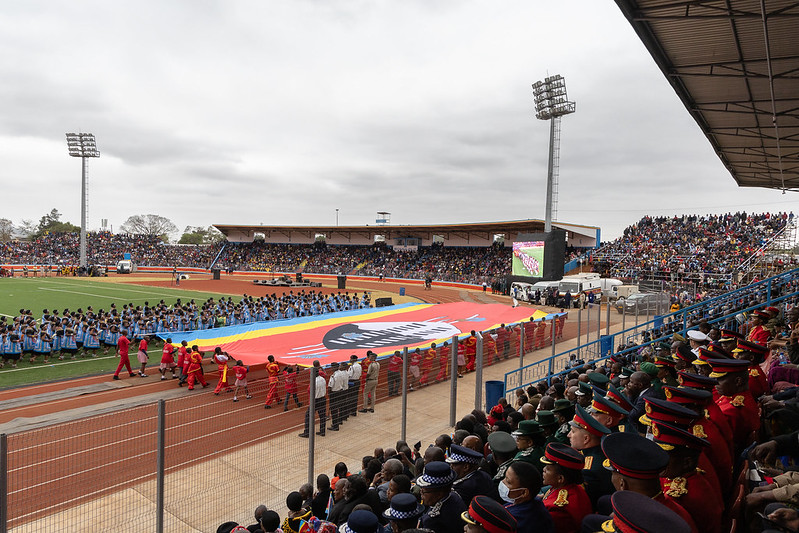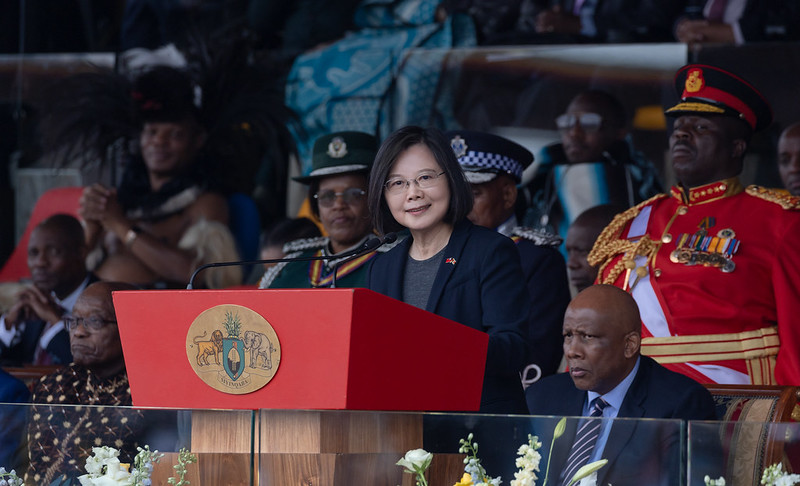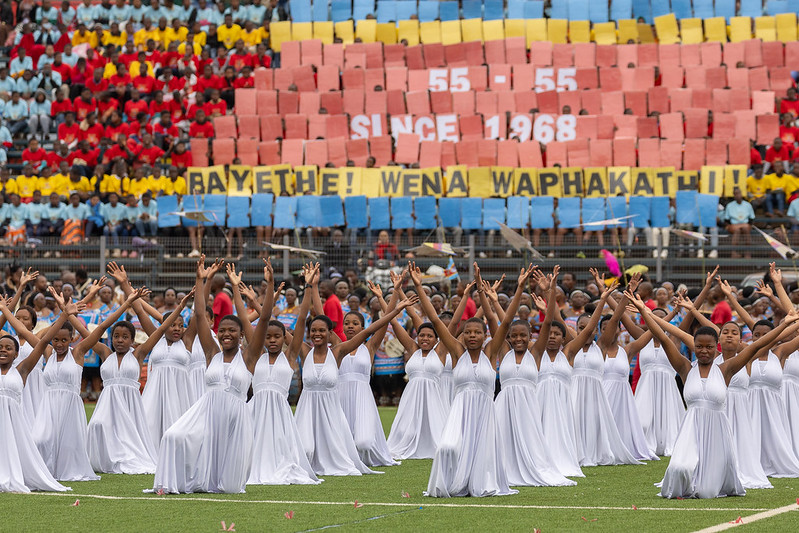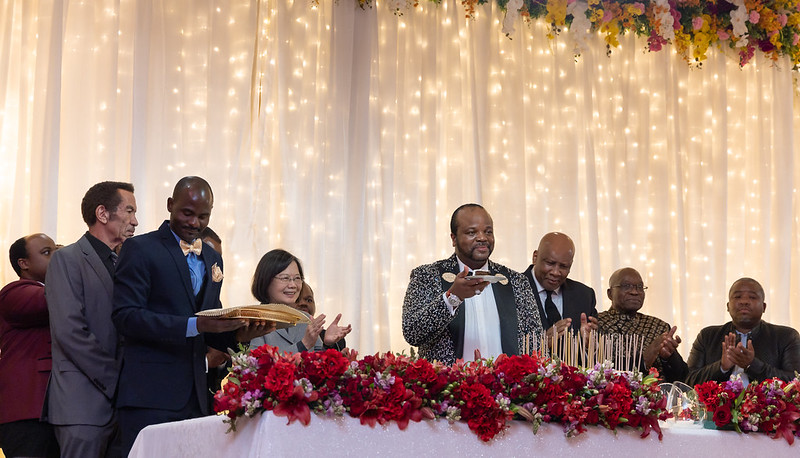News & activities
 News releases
News releases
At midday on September 6 local time (evening of the same day Taipei time), President Tsai Ing-wen attended the double celebration of the 55th year of Eswatini's independence and the 55th birthday of King Mswati III at Somhlolo National Stadium.
As the master of ceremonies called out the names of arriving dignitaries, the president's motorcade arrived at the stadium, where they received a warm welcome from members of the public attending the celebration. Soon after, King Mswati made his way to the dais and the national anthem of Eswatini was played, before the king reviewed the honor guard and the celebration officially commenced.
A transcript of President Tsai's remarks at the celebration follows:
It is a true honor to be here again in Eswatini and for such an auspicious occasion, that is, the double celebration of the 55th year of Eswatini's independence and the 55th birthday of His Majesty King Mswati III. On this important day, I wish a sincere congratulations to all Emaswati (Swati people).
Indeed, it is an important day for both our countries. Shortly after this day in 1968, the Republic of China (Taiwan) became one of the first diplomatic allies of the newly independent Swaziland. History brought us together and our warm friendship and mutual goodwill have kept us together these 55 years.
Over that time, our relationship has only grown closer. His Majesty the King has visited Taiwan 18 times since his ascension and I have had the pleasure of receiving him a number of times in Taiwan. I recall on his visit last year, he said that Taiwan has become, for him and other Emaswati, a "home away from home." It is my pleasure to echo that sentiment, as I have been made to feel right at home here in the Kingdom of Eswatini.
I still have fond memories of my first visit to Eswatini in April 2018. The hospitality of your people, their warmth and joy are just as present to me now as they were then. Now, five years later, being able to stand in your beautiful country again and witness Eswatini's continued growth and development, I have great pride for everything you and your people have accomplished and how you have overcome difficult circumstances.
Throughout it all, we have been proud to be an important partner to Eswatini. For more than five decades, this partnership has been the epitome of progress and development. Our collaboration on rural electrification has been so successful that Eswatini is now the second most electrified country in Africa, with 82 percent of its people having access to electricity. In the Sibaya held just this past July, His Majesty the King even noted that with such high levels of electrification, now "everything is in the light," and I am confident of an even brighter future for Eswatini.
As close friends, we share similar goals for the future. We both care deeply about young people and their education, which form the bedrock of any society. Taiwan has welcomed many students from Eswatini to study at our universities in fields as diverse as agriculture and education, management and medicine. And it is wonderful to see that many of these students are returning home, contributing to society, and helping prepare the next generation of professionals.
Another issue close to my heart is gender equality and women's empowerment. So, I am very happy to have a kindred spirit here in Her Majesty the Queen Mother, who is doing her utmost to raise the level of economic empowerment of women in Eswatini. To this end, Taiwan and Eswatini signed a memorandum of understanding for cooperation on women's empowerment in 2019, in an effort to give women more access to the financial services they need to succeed. To continue this meaningful cooperation, Taiwan will be assisting in setting up a Women Business Startup Microfinance Revolving Fund, in hopes of helping Her Majesty in her quest to uplift the women in Eswatini.
Being back among such steadfast friends, I must also take the opportunity to thank Eswatini for supporting Taiwan's participation in international organizations. Last year, His Majesty the King once again spoke up for Taiwan's meaningful participation at the United Nations General Assembly. Prime Minister [Cleopas] Dlamini has also voiced strong support for Taiwan on the international stage. On behalf of the people and government of Taiwan, I thank you for your support, now and in the future. Thank you.
Once again, I wish His Majesty the King a most happy birthday and offer my congratulations on the 55th anniversary of your country's independence. I must also congratulate Taiwan and Eswatini on our 55th year of our diplomatic relations. We have walked together and supported each other for over half a century now. Here is to setting and surpassing new milestones on our way to a century of friendship.
In his subsequent remarks, King Mswati thanked President Tsai for her remarks and King Letsie III of the Kingdom of Lesotho, former President Jacob Zuma of South Africa, and former President Ian Khama of Botswana for attending the celebrations. His Majesty said he was delighted to be celebrating the 55th anniversary of Eswatini's independence and his 55th birthday and welcomed everyone who made the journey to be a part of the celebrations.
Noting that occasions like this give everyone the opportunity to reflect on how far Eswatini has come, King Mswati recalled that in 1986 when he ascended to the throne, he committed to upholding the culture of his nation and ensuring its development. Stating that the greatest gift he could receive on his birthday is the peace of the nation, the king expressed hope that everyone can sit down together and engage in dialogue, even if many do not see eye to eye, so that Eswatini may advance.
He said that it was important to uphold such values of peace and dialogue, as this will bring Eswatini further in line with the United Nations and the African Union and help Africa achieve its goals. Addressing conflict in Africa, especially in the north of the continent, King Mswati said that we have to stop the wars in Africa so that the continent can develop.
King Mswati said that Eswatini has attained global recognition, as the World Bank has recognized the country for its GDP growth rate of eight percent, while Eswatini has also achieved the 95-95-95 target in the fight against HIV and AIDS, representing a great milestone for the nation. In order for Eswatini to maintain its trajectory and continue developing, especially in education, social welfare, and healthcare services, the king said there must be a reduction in unemployment and that Eswatini must maintain its vision of reaching first-world status. He also called on Eswatini's international partners to support his country in the pursuit of its goals.
King Mswati then expressed his thanks to everyone who contributed to the double celebration and made the event such a success.
That evening President Tsai also attended a banquet held by King Mswati at Lozitha Palace.
Also in attendance at the celebration were Minister of Economic Affairs Wang Mei-hua (王美花), Overseas Community Affairs Council Minister Hsu Chia-ching (徐佳青), Kaohsiung Mayor Chen Chi-mai (陳其邁), Deputy Secretary-General to the President Xavier Chang (張惇涵), Deputy Minister of Foreign Affairs Roy Chun Lee (李淳), legislators Chiu Chih-wei (邱志偉), Chiu Tai-yuan (邱泰源), Fan Yun (范雲), and Chiu Chen-yuan (邱臣遠), and Ambassador to the Kingdom of Eswatini Jeremy H.S. Liang (梁洪昇).












